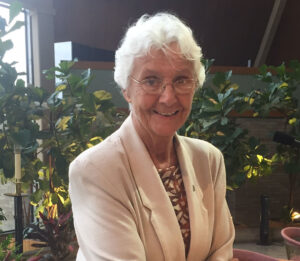|

Readings:
Is 35:4-7a
Ps 146:6-7, 8-9, 9-10
Jas 2:1-5
Mk 7:31-37
Dianne Bergant, CSA In the movie Back
to the Future, an enterprising character portrayed by Michael J. Fox
conspires with a brilliant, eccentric scientist to drive a transformed Delorean
into the past in order to do something that will change the present. It is a
delightful farce with both humor and suspense. In the end, the hero is left
with an appreciation of his present life. The readings for this Sunday invite
us to move through time, but in the opposite direction. They have a clear
eschatological or future focus. In other words, rather than look to the past
for the sake of the present, they have us look to the future – but still for
the sake of the present. In the oracle of
salvation taken from the Book of Isaiah, God promises to come with healing and
blessings. Those who are in any way prevented from living life to the fullest
will be freed from impediments and will sing and dance with joy. The
life-giving water promised symbolizes whatever is needed to achieve this peace
and fullness. Though the standards by which we live may differ one from
another, this is the kind of future for which we all yearn. In the gospel account,
we see Jesus fulfilling the promise that God made. His ministry establishes
God’s reign in which healing and the blessings of life are no longer merely
expectations of the future. Through the power of Jesus, they unfold before our very
eyes, or at least before the eyes of those who witness Jesus’ wondrous deeds.
The future is now in the present, and it did not arrive in the wake of some
delightful science fiction farce. This future is real, even though one needs
eyes of faith to recognize it. The responsorial psalm picks up the theme found
in these two readings. As we pray it, we rejoice that God’s promise for peace
and fullness of life has been kept. God has indeed removed the obstacles that
diminish life. We rejoice because “the God of Jacob keeps faith forever.” No one would dare
suggest that these two readings and psalm response picture situations as
fanciful as those produced by Hollywood. However, unless we too can step into
the mysterious future that they envision, they will remain simply religious
stories, and we will sit in the audience watching someone else’s drama unfold.
But how do we take that step into the future? The author of the Letter
of James offers an example of how this can be done. He describes a situation
with which we are all only too familiar. Who of us has not been impressed when
a fashionably dressed woman or man joins our gathering? If this is a person of
renown, we might fall all over ourselves showing deference. ‘Sit here, you can
see better. Can I get you something to drink?’ Do we show that same kind of
courtesy to those among us who are less fortunate or well-known? Is the one who
answers the phone less significant than the one who pays the salary? James insists: “Show no
partiality.” In a society like ours, where we dote on people who have money or
power or celebrity, this mandate is counter-cultural. We cannot deny that there
are differences in social status. However, if we show respect to all people,
regardless of the differences, treating them as children of God, we will be
taking a step into that future of peace and blessing. In a very real sense,
that future will be made present. As stated above, we look
to the future for the sake of the present. This is not the same as living in
the future because the present is too painful or just plain boring. Nor is it
the same as planning the future, which seems to be a favorite pastime of many
people. The future referred to in these readings is not simply the one we want
for ourselves. It is God’s future, the one that God wants for us. This is the
future depicted in God’s promises, the future in which we will be freed from
whatever prevents us from living life to the full. Though it is God’s
future, it does not simply dawn upon us one day. In a very real sense, this
future, which is really the reign of God, takes shape when we make a decision
to live God’s promises in the present. God holds out the possibility of this
future, but we must decide to step into it. The psalm offers other
examples of how we might step into that future. It will dawn upon us when we
work to ensure justice for those oppressed, food for those who are hungry,
freedom for those unjustly held captive, sight to those who cannot see, relief to
those crushed by life, protection to widows and orphans, and respect to
strangers. This is the future promised by God, and each time we accomplish such
feats we bring God’s future ‘back to the present.’ Praying with scripture
- Who do you know that has brought
peace and fullness to the world? What did they do?
- How might you
bring the future of peace and fulfillment into the present?
- Go out of your way to show respect to someone who is normally
overlooked or disdained.
|
No comments:
Post a Comment